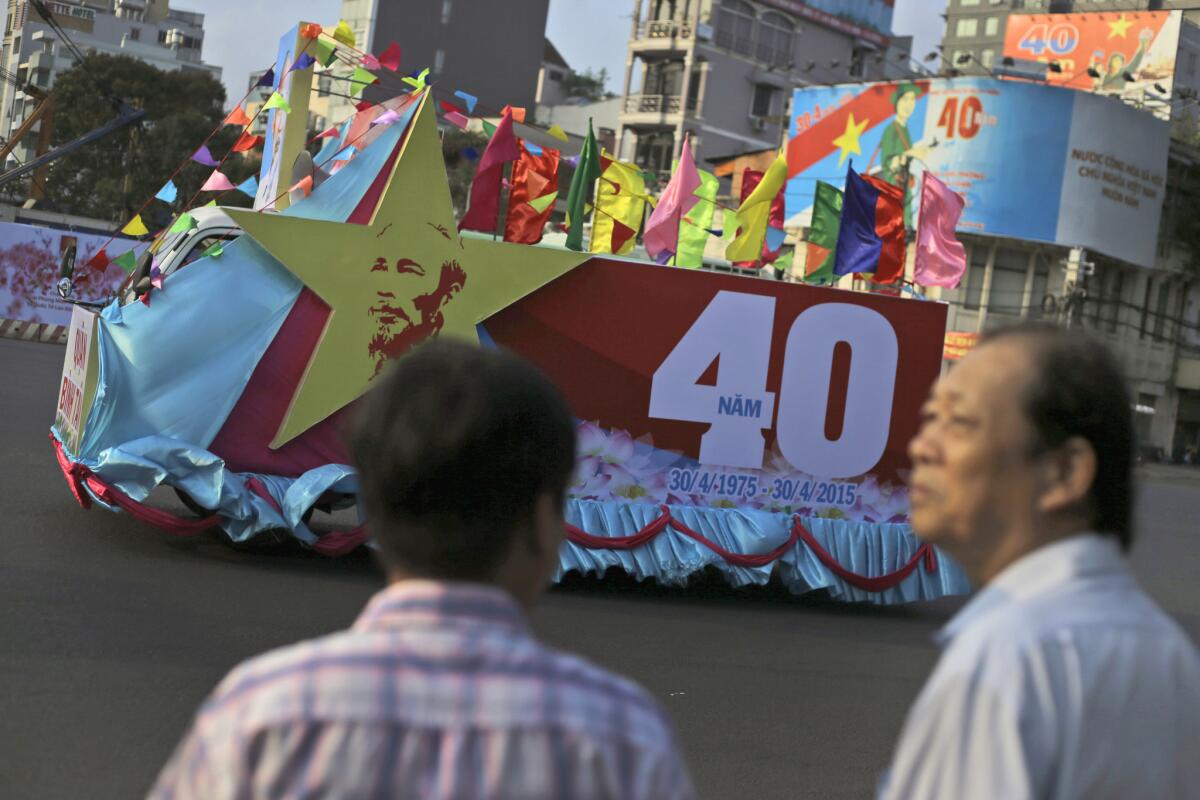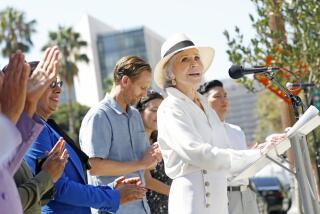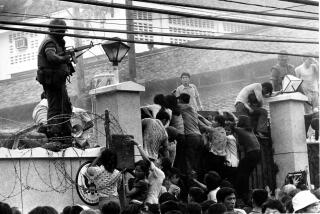Op-Ed: Is it Liberation Day or Defeat Day in Saigon?

- Share via
The first time I returned to Vietnam, a customs officer looked at my American passport and asked, “Brother, when did you leave?”
“Two days before National Defeat Day,” I mumbled.
That day, April 30, 1975, marked the end of the Vietnam War. Its anniversary brings back bad memories: Saigon ransacked by the communist army, thousands fleeing in boats, helicopters hovering above a city wreathed in smoke. My family and I made our way first to Guam and then later to California. I was 11.
National Defeat Day turned into an unhealed wound for many who fled and some who were left behind. But the words are from an exile’s vocabulary.
“Brother,” the customs officer corrected me, “don’t you mean National Liberation Day?”
Last month, I was back again. No one questioned me when I went through customs. I was neither a prodigal nor a curiosity, just another traveler. No one remarked on the timing, so close to the 40th anniversary of defeat and liberation.
“Please, who wants to talk about stories of such ancient time?” was how Hoang Tran, 27, put it when I asked him what April 30 meant to him. We were in a bar in downtown Saigon. “No one pays attention to this kind of fairy tales,” said his drinking companion, Binh Nguyen, 24, who was on his fourth whiskey.
“How much did you pay for that iPhone 6? It’s so expensive here in Vietnam,” said Binh.
“Yeah, but I’m saving money for it,” added Hoang.
In 2015, Vietnam belongs to the young. And the young don’t look back. Two out of three Vietnamese were born after the war; most of the population is between 20 and 25 years old; they have no direct memory of the war America lost, the war that undid the South and reunited their country under a communist system more pragmatic than pure these days.
I went to a posh party thrown for a friend’s birthday on the outskirts of Saigon, where condos dot the landscape. The children of those who fought on opposite sides of the old war drank champagne on a balcony looking out toward a brand-new city full of gleaming high rises.
“Let’s not talk politics, that’s boring,” the hostess admonished me in a cordial manner as she refilled my crystal flute. “Talk about your trip to Egypt. We plan to go next year.”
And why not? Years of economic progress and the forces of globalization have blurred the line between who was liberated and who was defeated, between enemies and friends. Vietnamese Americans, those who fled or more likely the children of those who fled, are returning “home,” where the dollar goes a long way and opportunities — making movies, making wine, making money — abound for overseas Vietnamese, the Viet Kieu.
Henry Nguyen, 41, epitomizes the trend. He fled Vietnam as a child with his parents and spent months in a refugee camp in Thailand. In time he became a Goldman Sachs associate from Virginia. Now he is famous for bringing McDonald’s, Pizza Hut and venture capital to Vietnam. In 2006, he married the daughter of Vietnam’s prime minister.
The war “forced people who share common values and culture to pick sides,” Nguyen told Reuters recently. “It’s kind of like a tragicomedy.”
Tragicomedy indeed, then and especially now. One night in Saigon, I walked by a man kneeling at the trunk of a tamarind tree burning paper offerings to the dead, a practice as old as history itself. But instead of traditional cutouts of gold bars and horse carriages, he offered paper cellphones, iPads and a paper flat-screen TV to the flame. “My mother wouldn’t want gold if she can have her cellphone to call her friends in the world of the living and gossip about her favorite Korean soap operas,” the man joked.
What was going up in smoke, of course, were Vietnam’s old sensibilities, defined for millenniums by war and strife, rooted in the culture’s perception of suffering as fate but now sliding seamlessly from tragedy to optimism.
Turn on the TV here and you’ll see what I mean. There are fashion shows, romance movies, game shows in which you can win a car, cash or a new computer. But most popular of all: “Vietnamese Idol” and its brethren.
You don’t need to know Vietnamese to follow the plot. A rural teenager or a humble nurse, maid or street vendor appears. She’s nervous, full of self-doubt. But when she sings, we hear a golden voice. Soon she is transformed. We see her studied gesture of shyness, the chic skirt, the expert makeup. Her mother waits backstage, as much a yokel as ever, weeping with happiness. The American dream is alive and well in Vietnam.
The Vietnam War and its terrible aftermath are fading from living memory. There are those — like my parents, scarred by the war, robbed of their home, sent to reeducation camps or forced out to sea to live or die — who do not forget. They know the bitter answer to that question of winners and losers, defeat and liberation.
I fall between the boys in the bar and those unhappy exiles and war veterans. I have made my peace with the past. Aware of what has been lost but not immune to what has been gained, I choose resilience over resentment and anger. Or rather, for me, there will always be two Vietnams: the one of childhood memories, defined by an impossible longing, and the new Vietnam, a fascinating country that’s running toward an unknown future at breakneck speed.
Defeat Day or Liberation Day? On April 30, I will be teaching a graduate writing workshop at San Jose State University. I will tell the story of how I became an American writer, how I learned to bear witness to a constantly shifting world, and how a child of defeat, through the act of storytelling, found his way to self-liberation.
Andrew Lam is the author most recently of a collection of short stories, “Birds of Paradise Lost.” He is a senior editor for New America Media in San Francisco.
Follow the Opinion section on Twitter @latimesopinion and Facebook
More to Read
A cure for the common opinion
Get thought-provoking perspectives with our weekly newsletter.
You may occasionally receive promotional content from the Los Angeles Times.










